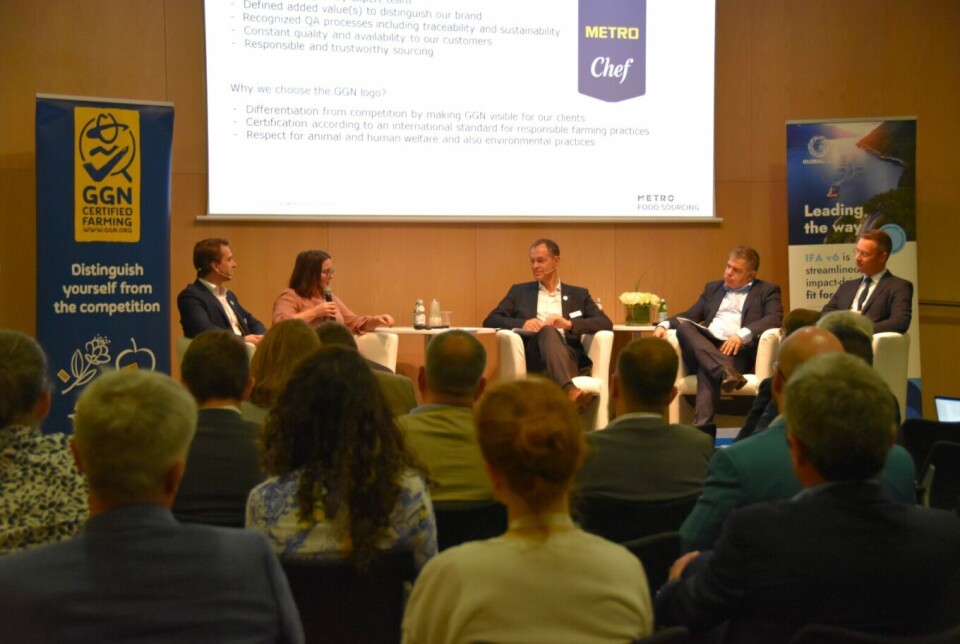CONTENT MARKETING

GLOBALG.A.P. Panel Discussion Slated for SEG: Supply Chain Transparency and Responsible Aquaculture
This informative panel discussion with industry leaders will explore current topics in supply chain transparency in the aquaculture industry.
Stakeholders from across the aquaculture supply chain will be gathering at Seafood Expo Global (SEG) in Barcelona, just weeks away. As part of the SEG conference program, the farm assurance brand GLOBALG.A.P. will be hosting a panel discussion focusing on supply chain transparency in Europe and worldwide. The brand’s farm assurance standards for aquaculture have been developed over the past two decades and include timely topics like food safety, environmental responsibility, workers’ well-being, animal welfare, and supply chain traceability.
SEG brings industry experts together from around the globe and provides a format for attendees to glean the latest actionable information to confront today’s challenges. The SEG conference program will feature educational sessions on corporate social and ecological responsibility, traceability, and transparency. The informative and free panel discussion on supply chain transparency hosted by GLOBALG.A.P. is scheduled to begin at 02:00 p.m. on 23 April and will be held in Conference Centre 5, Conference Room CC 5.2. Those planning to attend are encouraged to pre-register at the organisation’s website.
Diverse panellists for comprehensive supply chain solutions
The panel will be moderated by Marco Frederiksen, Director of Eurofish Magazine, who will guide the discussion through the topic of supply chain transparency, both in Europe and beyond. Panel members engaging in the discussion will be experts selected from across the aquaculture industry. Attendees at the discussion can expect to hear diverse perspectives from key areas of the supply chain.
The panel will include the following representatives:
Audun Lem, Deputy Director of the Fisheries and Aquaculture Division and Secretary of the FAO Committee on Fisheries (COFI)
Dawn Purchase, Aquaculture Programme Manager at Marine Conservation Society
Teresa Fernandez, CSR & Sustainability Senior Manager/Seafood & Added Value Europe at Hilton Foods
Carlos Tavares Ferreira, Sustainability and Quality Director at Stolt Sea Farm
Remko Oosterveld, Aquaculture Key Account Manager at GLOBALG.A.P.
These diverse perspectives will highlight ways that all individuals in the supply chain can unite behind the common goal of promoting responsible, safe, and responsible aquaculture.
Supply chain legislation and traceability in focus
According to GLOBALG.A.P., the discussion is expected to address the impacts of existing and upcoming supply chain legislation in the EU and will highlight how voluntary certification can encourage good aquaculture practices throughout the supply chain.
Other topics expected from the discussion include a holistic approach to improving traceability through cross-sector collaboration, and how data-driven traceability systems, including traceability of compound feed raw materials like soy, fishmeal, fish oil, and palm oil, promote responsible farming practices. Panellists are also expected to bring out solutions for fostering responsible production in Europe and worldwide and will discuss how improved supply chain legislation and transparency requirements can benefit both retailers and consumers.
Working together for the common goal of responsible aquaculture
Today’s aquaculture industry faces rapidly changing environmental and regulatory landscapes. These require all stakeholders from across the sector to work together to promote responsible farming practices in Europe and worldwide. Input gleaned during the discussion from stakeholders of diverse backgrounds will allow policymakers and standard setters to hear real-world voices and stay abreast of current industry challenges.
GLOBALG.A.P. representatives are expecting lively participation in this upcoming discussion. The discussion panel’s unique format draws insights from across the supply chain and fosters the collaboration needed to develop smart, independent, and effective solutions to promote responsible aquaculture now and into the future.






















































